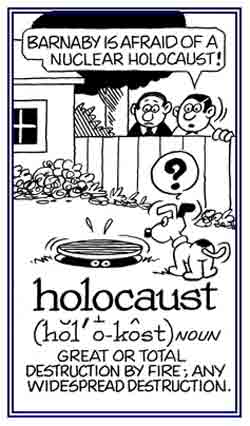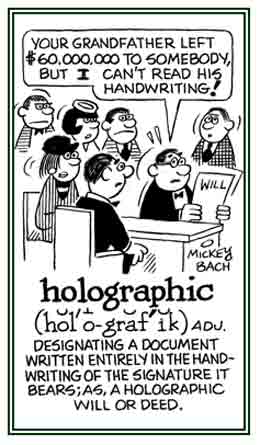holo-, hol-
(Greek: whole, entire, complete)
holandric (hol AN drick, ho LAN drick) (adjective), more holandric, most holandric
Pertaining to genes that are carried by the Y chromosomes: "The holandric genes are produced only through the paternal, or male, and never by the female."
Genes that males have from the Y chromosomes: "The Y-linked genes can only be transmitted from a father to his son."
Primarily in philosophy, the theory that parts of a whole are interconnected to such a degree that they cannot exist independently from the whole or cannot be understood without some reference to the whole: "Holism is usually applied to mental conditions, languages, or ecological situations."
holistic (adjective), more holistic, most holistic
1. In medicine, descriptive of the treatment of the whole patient: "The holistic approach by a physician also considers the mental and social factors in additions to the physical symptoms of a disease."
holistically (adverb), more holistically, most holistically
Characterized by being able to understand the parts of something as being interconnected and explainable only by reference to the whole.
holoantigen
holocarpic
1. A great or complete devastation or destruction, especially by fire: Several examples of holocausts took place in California and some other states during 2014.
2. A sacrifice completely consumed by fire; burned offering: Historical records reveal that many religions in the past used a form of holocaust when they sacrificed animals to their gods.
3. The systematic mass slaughter of European Jews who were placed in Nazi concentration camps during World War II (usually preceded by "the" and capitalized; such as, The Holocaust).
4. Any mass slaughter or reckless destruction of life: Totality of destruction has been central to the meaning of holocaust since it first appeared in Middle English in the 14th century, used in reference to the biblical sacrifice in which a male animal was wholly burnt, or cremated, on the altar in worship of God.
5. Etymology: from Greek holokaustos, "that which is completely burned", which was a translation of a Hebrew word, literally, "that which goes up", that is, "in smoke". In this sense of "burnt sacrifice", holocaust is still used in some versions of the Bible.

© ALL rights are reserved.
Go to this Word A Day Revisited Index
2. A sacrifice completely consumed by fire; burned offering: Historical records reveal that many religions in the past used a form of holocaust when they sacrificed animals to their gods.
3. The systematic mass slaughter of European Jews who were placed in Nazi concentration camps during World War II (usually preceded by "the" and capitalized; such as, The Holocaust).
4. Any mass slaughter or reckless destruction of life: Totality of destruction has been central to the meaning of holocaust since it first appeared in Middle English in the 14th century, used in reference to the biblical sacrifice in which a male animal was wholly burnt, or cremated, on the altar in worship of God.
5. Etymology: from Greek holokaustos, "that which is completely burned", which was a translation of a Hebrew word, literally, "that which goes up", that is, "in smoke". In this sense of "burnt sacrifice", holocaust is still used in some versions of the Bible.
In the 17th century the meaning of holocaust broadened into "something totally consumed by fire", and the word eventually was applied to fires of extreme destructiveness.
In the 20th century, holocaust has taken on a variety of figurative meanings, summarizing the effects of war, rioting, storms, epidemic diseases, and even economic failures.
Most of these terms came into existence after World War II, but it is unclear whether they resulted from the use of holocaust in reference to the mass murder of European Jews and others by the Nazis. This application of the word occurred as early as 1942, but the phrase The Holocaust did not become established until the late 1950s.

Go to this Word A Day Revisited Index
so you can see more of Mickey Bach's cartoons.
holocryptic
Wholly hidden or secret; specifically of a cipher incapable of being read except by those who have a key.
holodont
holognathous
The whole or entire jaw.
hologram
1. A three-dimensional image produced by wavefront reconstruction and recorded on a photographic plate.
2. A pattern produced when light (or other radiation) reflected, diffracted, or transmitted by an object placed in a coherent beam is allowed to interfere with an undiffracted background or reference beam related in phase to the first (or identical with it); a photographic plate or film containing such a pattern.
2. A pattern produced when light (or other radiation) reflected, diffracted, or transmitted by an object placed in a coherent beam is allowed to interfere with an undiffracted background or reference beam related in phase to the first (or identical with it); a photographic plate or film containing such a pattern.
A document entirely handwritten by its author; especially, a manuscript, a letter, or an unwitnessed will: Before Jerry left for his trip to Europe, he wrote out a detailed daily plan, or a holograph, as to when and where he expected to be for the month.

© ALL rights are reserved.
Go to this Word A Day Revisited Index

Go to this Word A Day Revisited Index
so you can see more of Mickey Bach's cartoons.
holographic (adjective), more holographic, most holographic
A reference to a document that is produced in the handwriting of the person whose signature is located there: When Shirley's father wrote his will about how the family's property should be distributed, he wrote an official holographic one so his lawyer would have the authorized procedures which were to be completed after his death.

© ALL rights are reserved.
Go to this Word A Day Revisited Index

Go to this Word A Day Revisited Index
so you can see more of Mickey Bach's cartoons.
1. A letter or other document written entirely by the person in whose name it appears; completely in the author’s handwriting.
2. A method of recording and showing a three-dimensional image of an object using a photographic plate and light from a laser.
2. A method of recording and showing a three-dimensional image of an object using a photographic plate and light from a laser.

